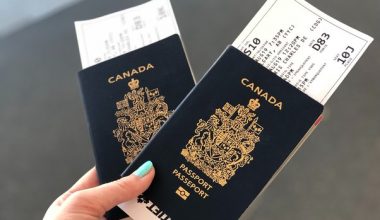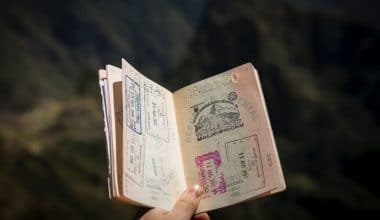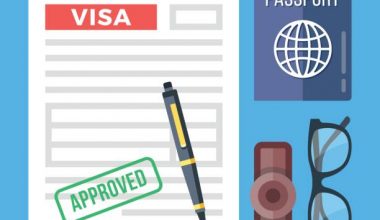With over 6 million international students worldwide, student visas are in higher demand than ever. The idea of spending a semester or completing a study program abroad appeals to young students all over the world. However, anyone who wishes to study abroad must first learn how to apply for a student visa.
A high percentage of International students prefer more developed countries such as the United States, United Kingdom, China, and Canada. There are certain student visa rules to keep an eye out for if you are a student looking to pursue higher education in any of these countries. Knowing some of these student visa rules gives you an advantage in the application process.
Are you interested in getting a student visa? Keep reading as we review everything you need to know about student visas and the student visa rules for some of the top selected countries.
Also read: ICE Immigration Laws For International Students
What is a student visa?
A student visa is a government-issued immigration document. A consulate general or embassy that allows you to study legally in a specific country for a specific period give it. A visa is typically an endorsed sticker or stamp on the inside pages of your passport. Your student visa is just as important as your passport; without it, you will be unable to study abroad if your program requires it.
Each country has its own visa application process, requirements, and fees. Some countries may require you to travel to a consulate or embassy in select U.S. cities for an in-person appointment. Contact the consulate or embassy of your host country for the most up-to-date visa information. Obtaining a visa is an honor, not a right. Because a consular office may deny your visa application, it is best to follow their guidelines and apply as soon as possible.
Also read: How to Get Student Visa Sponsorship | Step-by-Step Procedures
What are the types of student visas?
Student visas are frequently classified based on two broad distinctions.
Classification of Student Visas Based on Program Duration
Countries frequently divide student visas into Short term Student Visas and Long term Student Visas. This depends on the length of tenure of the program the applicant intends to pursue. Students who plan to take a short course of a language or a diploma certificate course are frequently granted short-term visas, with the total duration often limited to 3 months.
Long-term visas, on the other hand, are for students who intend to pursue degree programs that last longer than three months. Internships and 6-month certificate programs, for example, could fall into this category.
Classification of Student Visas Based on Program/Student
Some countries categorize student visas based on the type of student, regardless of course duration. This could be the level of degree sought (undergraduate, graduate, or doctoral), an exchange student, or a student pursuing a vocational/diploma program.
In general, because these visas are dependent on the type of visa the student is applying for, they are somewhat linked to tenure. However, in these sections, the first point of differentiation is not the duration of the program. If you are an exchange student, you could be there for three months or three years; the category would depend on the type of student, not the length of stay.
Also read: How Long Does a Student Visa Last & How can I Renew?
Requirements for a student visa
The requirements for obtaining a student visa vary from country to country. The general student visa requirements include:
Passport
In support of your visa application, you must provide your original, valid passport. Some countries, such as the United Kingdom, have provisions for your passport to be electronically verified online. This eliminates the need for an in-person appointment at a visa application center.
If you are unable or ineligible to use the app, you should submit the original passport with your visa application. In this case, your passport must include at least one full-page that is blank on both sides. There is no requirement for your passport to be valid for an extended period of time; however, it must be valid when you apply for a visa.
Financial evidence
Most countries will require you to demonstrate that you are capable of not only covering tuition and college expenses but also of affording your stay in that country for the intended study period. While many countries have a set amount of money they need, others have broader, more extensive guidelines.
For example, many European countries (such as the Netherlands) have a minimum living cost determined by government standards. Students applying for student visas in these countries must, as a result, provide proof that the required amount is available to them in cash.
Language proficiency
A basic requirement in different countries is proof that you can communicate in the language that will be your medium of instruction. Because the majority of students intend to study in English-speaking countries, the majority of them will require you to provide proof of your ability to communicate in English – both written and verbally.
This is typically accomplished through a minimum score requirement for various English Language Tests such as TOEFL. As a result, if you intend to take a course in another language (say, Spanish), you must provide certification for that language in accordance with the CEFR Certified Levels.
It is important to note that, while universities may accept any or both of the above-mentioned tests, the requirements for Visas are sometimes set. Confirm that the test is relevant to the country’s immigration department before taking the test. Furthermore, Visa Guidelines for various countries usually require a minimum score. While universities may admit students with lower scores, they can deny your student visa till you meet the minimum standard.
Evidence of a Legitimate Student
If you are applying for any type of Student Visa, regardless of which country you are applying to, you must be able to demonstrate that you are a genuine student. This is frequently accomplished by presenting proof of admission to a school in that country.
How to apply for a student visa?
The steps to applying for a student visa usually depend on the student visa rules of the country. The application process for an international student visa begins when your university sends you a letter of acceptance. Students who have received their acceptance letter must proceed with the Visa Application Process. Candidates can apply for a visa in two ways:
- Online Visa Application Process: The more convenient option, candidates can apply for their student visa online by simply creating a student profile. The forms are all online and you must complete them correctly.
- Offline Visa Application Process: For the offline visa application process, candidates must download the application form, fill it out, and submit it to the appropriate authorities.
The next step is to pay the Visa Application Fee. For the application process, you are to pay a student visa fee. The final step would be for the student to submit his application process, as well as any supporting documents.
Facts to Note about your student visa
- Typically, a student visa is valid for the duration of your studies. However, it is possible that you will need to apply for a visa renewal during your studies in some cases. Check to see if you are from a country that requires visa renewal during your studies.
- Some countries allow international students to work part-time on campus (fewer than 20 hours per week). However, work regulations for students are rather strict and complicated, so you may want to ensure that you have enough funds to avoid having to work for the duration of your studies.
- To keep your student visa, you must remain enrolled at your university and maintain good marks. If you are unable to complete your program within the time frame specified, your international adviser can assist you in requesting a program extension.
- If your passport is about to expire, your country’s consulate or embassy can assist you in extending it.
Common student visa rules
There are various student visa rules and most of them vary from country to country. Some of the student visa rules for some countries include:
USA
If you intend to apply for an F-1 student visa, you should be aware of several F-1 visa rules. Below are the student visa rules to follow for your student visa application.
- SEVP Immigration & Customs Enforcement must approve the college or university where you intend to study.
- Full-time enrollment means that you must enroll as a full-time student at the institution during the academic term.
- You must meet the institution’s required English language proficiency score or enroll in courses that will help you improve your English proficiency.
- You must demonstrate that you have enough money to cover your studies and living expenses while in the United States.
- Your passport must be valid for at least six months after the completion date of your program.
- You must have a residence in your home country to which you will return after completing your degree.
Also read: What are the Student Visa Requirements in the U.S?
U.S visa application process
Get accepted
When a SEVP-certified US university accepts you, the F-1 student visa application process begins. SEVP certification is the United States government’s way of proving that your university has accreditation and has the necessary resources to provide you with an education. Your university will issue you an I-20 form once you make the acceptance list. This form records your study plans and provides additional information about your stay.
As soon as you receive your I-20, double-check all of your information and sign at the bottom of the first page. It can take a long time to correct an error on your I-20, incorrect information can deny you entry into the country. Keep your I-20 form with you when you travel to the United States. You will need it to enter the United States, work, and participate in other activities.
SEVIS fee
The total cost of your F-1 student visa will be around $510, which includes the visa itself as well as SEVIS processing and maintenance fees. Make a copy of the I-901 SEVIS fee receipt. It could be a requirement for your visa interview.
DS-160 Visa Application
Your visa application is usually in your DS-160. To obtain an F-1 visa, all prospective international students must complete a DS-160 form. Your I-20, passport, travel itinerary, and a photo for your visa are all required. You will receive a printed confirmation with a barcode after successfully submitting your DS-160. You should save this form because you will need it for your visa interview.
Schedule an interview date
Schedule your visa interview at the nearest US embassy or consulate. Wait times vary by country and can last months, so make your appointments as soon as possible. Inquire with your enrollment advisor about student visa interview tips or how to set up a mock interview session if you are enrolling at a US university.
Visa interview
The US consulate or embassy confirms your status as a legitimate, serious student during the interview portion of the F-1 visa application process. In your visa interview, you must also demonstrate that you have sufficient funds to cover your time studying in the United States. This is proof that you intend to return home on completion of your studies.
Though there are a few rare exceptions, attending your visa interview in person is compulsory (e.g., if you are younger than 14 or older than 80 years of age, or if you meet certain visa renewal requirements).
After passing your visa interview, you will receive your F-1 visa and the F-1 status. You are now authorized to study in the United States!
Canada
To get a study permit for Canada there are certain student visa rules you should watch out for, they include:
- You must demonstrate that you have a clean record and no criminal history. To demonstrate this, the applicants must present a police verification certificate.
- You must agree to leave Canada on completion of your studies.
- You must undergo a health examination and obtain a medical certificate certifying that you are in good health.
- You have an admission certificate from a recognized educational institution (DLI).
- You must demonstrate that you have sufficient funds to cover your tuition and living expenses.
Also read: How to Apply for Student Visa in Canada | Interview, Requirements, Permit
Student visa application process in Canada
The visa application cycle can take4 weeks. It is advisable that you visit the Canadian consulate’s website to find out how long it will take to process the student visa. Please keep in mind that the time displayed is only an estimate and not a guarantee.
Determine your application strategy. There are two methods for applying:
1 (a) Submit an online application
To apply online, you must have access to a scanner or camera to make electronic copies of your documents for uploading, as well as a valid credit card. At the regional Visa Application Centre, you will need to provide a finger scan (VAC). Remember that in the case of Online Applications, you must visit the VFS offices to hand in your passports and provide confirmation of form and fee payment. The steps would only differ in terms of the documents you would need to bring to the VAC.
(b) Apply in person
Download the application kit and read the user manual. The instruction guide contains vital information about study permits as well as instructions to assist you in completing your application. Read the guide thoroughly and make use of the document checklist. Completing the VFS Consent Form and attaching it to your application form. This form is necessary if you want VFS services to help you with your visa application.
2. Pay the processing fee
Keep in mind that you must pay visa fees in addition to VFS Global service charges when submitting an application through the VFS, whether in person or by mail. In all cases, the processing fee is non-refundable. If you are traveling with your spouse or children and are applying for temporary resident visas, work permits, or study permits for them, you must pay the appropriate processing fees for them.
3. Submit your application and supporting documents
You must go to your local VFS office. Once there, pay the service fees and hand in your completed application to receive a receipt. This receipt includes your unique tracking number, which you will need to track the status of your application online.
If the Government of Canada approves your application, you will receive correspondence requesting your passport. You should submit the passport and passport request letter in person or through VFS. You would receive a Temporary Resident Visa as well as a Letter of Introduction.
Germany
To get a student visa to study in Germany, you must ensure that you follow the following student visa rules:
- Proof of Financial Resources: You must meet the income requirements in order to receive a German student visa. (REQUIRED)
- You must have a letter of commitment from a person living in Germany stating that they will cover your accommodation or other living costs (OPTIONAL)
- Declaration letter: Your parents are demonstrating that they will provide you with financial support during your stay. (OPTIONAL)
- Scholarship certificate: If you have a scholarship award, the certificate should state what the scholarship will cover and that you are the recipient of that financial assistance.
- You must provide proof of German language proficiency. (For German or mixed-language programs.)
- You must provide proof of English language proficiency. (For English or mixed-language programs.)
Also read: Study In Germany: How Do I Apply for Masters in Germany In 2024
Germany Visa application process
- Go to your country’s German embassy or consulate and submit your application there. You should go there and request more information about the application process, as well as make an appointment. If your country does not have a German Embassy, go to a German Embassy/Consulate in a neighboring country or an application center to which the German authorities have outsourced visa applications.
- Examine all of the required documents. Before you go to your appointment, make sure you have all of the necessary documents. You can find specific document requirements for your country can on the official websites of German embassies.
- Prepare for the German student visa interview by researching common interview questions online. What’s more, you should bring the visa application fee payment confirmation with you to the interview.
United Kingdom
Some of the student visa rules in the UK include:
- You must meet the financial requirements to demonstrate that you have enough money to cover your course fees and living expenses.
- You must have passed an English proficiency test that the university approves.
- The application form requires you to declare and provide details about any criminal convictions, including traffic offenses, that you have received in any country.
Also read: UK Student Visa Requirements 2024 [DETAILED]
UK student visa application process
If you live outside the UK, you can apply for a UK Student Visa as early as six months before the start of your courses. Before going to a Visa Application Center in your country to submit your biometrics, you must first start the online application on the UK Government website.
Your education provider will send you a reference number known as a Confirmation of Acceptance for Studies once they have offered you a place on the course. You must enter this number during your online registration. Depending on your country of residence, you will receive instructions on how to proceed after submitting your online application.
Also read: Top 7 Guidelines for Getting a Student Visa in Every country
Frequently Asked Questions
The duration varies depending on your country of choice.
Most countries require a proficiency test in English and financial stability proof.
Some countries approve of student visa extensions while it’s restricted in some.
Yes, you can work while studying with your student visa.
Your student visa application might take months before it’s ready.
Conclusion
Student visa rules are part and parcel of the student visa process in many countries. Thes rules are to serve as a guide to international students applying to their country for study. This post has reviewed everything you need to know about student visas, drawing focus from some of the most applied countries for student visas.
References
- travel.state.gov – Student Visa
- westminister.ac.uk – Documents required for a Student Visa
- visaguide.world – F1 Visa
- gov.uk – Student visa
- ukcisa.org.uk – student route: eligibility and requirements
- canada.ca – Study permit: How to apply
- Image link





